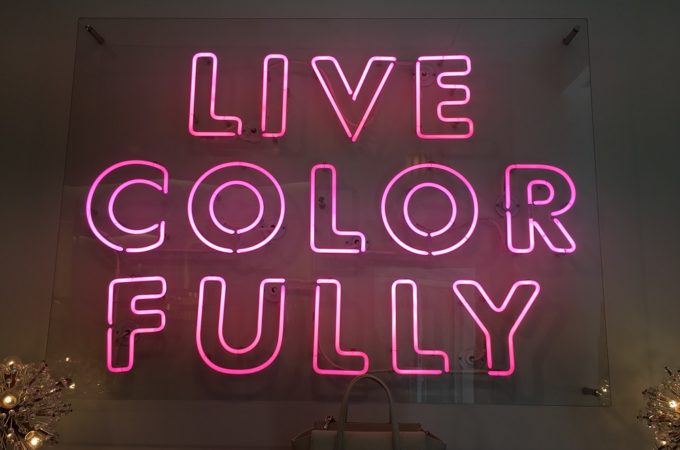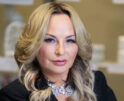
Do We Want To Choose Pink?
In a show of unity and tribute to U.S. suffragists, women lawmakers wore white at the recent State of the Union address, and garnered attention because of it; such is the power of identifying with a color. Watching the “suffragette white movement” reminded me of the question that has been stirring in my mind for months. So, as the editor of PINK, I had the chance to ask, have we forgotten what “truly” sets women apart?
I, like you, watched these women applaud with high cheers, for themselves, when President Trump addressed women issues. Yet, few stood with respect and applause toward veterans, the ICE agent that was present, or other notable worthy causes that “unite” our country. How do you explain this behavior? Whether we agree or disagree with their position, the point is, identifying with a color makes a statement about what we believe.
This year at Little PINK Book, we celebrate 15 years of publishing, once on newsstands for some time, and now digitally and continuing to expand on our annual conferences. Pink. It’s the color of choice when you cheerfully pop the surprise balloon and learn, it’s a girl. It’s the color that little girls grow up to love and admire as they play princess in need of a hero. Pink, it’s the color we proudly showcase when we’re surviving breast cancer for ourselves, or our loved ones.
Pink, it’s known for compassion, empathy, sensitivity, friendliness, caring, gratefulness, and fun. Pink signifies romance, love, and friendship. “We at PINK, also believe it represents power and strength and authenticity, and a comfort level with our femininity; ownership of who we are,” says founder and CEO Cynthia Good. It is an affectionate, intuitive and insightful color, symbolizing kindness and hope. It is a very positive color inspiring comfort and reassurance. Pink can alleviate feelings of anger and aggression. In fact, studies confirm pink has a calming effect and puts people in a nurturing mood, hence pink Himalayan bath salts and pink salt lamps. Pink is non-threatening and appreciation-seeking. It can signify good health and it implies gratitude.
I am proud of pink. And, I want to be pink.
Something many don’t know, I longed for the day to work with PINK. As the former editor of Aventura Magazine in Miami, I used to rush to Barnes and Noble during cafecito time and couldn’t wait to see the face of the woman featured on the next issue of PINK. The faces of these women, from 15 years ago were faces of joy, success, gratitude, and all things pink. Yet today, what are we choosing to become? “Women often feel pressure to be tougher than we are or want to be; more manly, more not ourselves,” says Good. We know choosing bitterness, anger, and punching and elbowing anyone who gets in our way, doesn’t make us happier and really don’t get us ahead. What happened to embracing the art of being a woman? Allowing ourselves to be adorned by the simple beauty of why we were created in the first place? Remember long ago, wisdom once said: You can catch more flies with honey than with vinegar. But, what are we “doing” with wisdom? Can’t we be tough – and authentic and kind too?
To get even deeper on this topic, I met with women from different walks of life for a round-table discussion. These women are young, some newly married, some married for over 55 years, some with kids, some divorced, some older than I, some younger. I asked what they remember from 15 years ago and to dig into memories from the 60s, 70s, 80s, and 90s. I learned. I laughed. I was shocked. And, laughed some more. As I looked around the room, many were wearing shades of pink and their faces glowed with rose joy.
I then spoke with two millennials, one señorita, a lucrative professional, as well as a GenXer. When I asked these women to define the art of being a woman, many thought it was a complex question, yet they were eager to begin digging. “When I think of what it means to be a woman, I think of strength,” says Alex Baker. Baker believes that we, as women were created with strength to not only be responsible for own lives, but to also take on the role of one of the most important tasks that could be asked of her: raising the next generation. “Being a woman is grace, dignity, kindness, respect, confidence, and love all wrapped into one package. It’s looking adversity in the face and not only going through it but overcoming it,” she adds.
Elizabeth Saylor Davis says, “To me, the art of being a woman is welcoming the art of being yourself. We have finally come to a place where we can choose to totally buck the system or take that original model and stretch and bend it into something that matches our true self.”
There are parts of that traditional model that Saylor Davis has always resonated with, and many aspects that she has not. “The one thing I have always known is that I longed and needed to be a mother,” she says. At the same time, she thrives working outside of the home and having projects and long-term goals that belong only to her.
“While I work to conquer that space…my house tends to lean toward a state of disaster. I’ve decided, the kids are clean and happy, so I can be “more fluid” in that area and apparently not having a tidy house is just going to be a part of the art of being myself. Sorry, mom,” she laughs.
Sarah Fandrey believes women have a specific purpose, and is learning how to embrace that purpose and role. Wise beyond her years, Fandrey advocates finding your voice and using it to speak up and to speak truth. “It’s learning the difference between humility and strength and embracing them both. It’s being advocates, encouragers, innovators, and world-changers while also being mothers, wives, sisters, and friends,” she adds.
I asked what they thought women have lost or gained these past 40 years, Ashley Trammell, was quick to answer, “In the past 40 years, women have lost much by trying to define or re-define feminism.”
Trammell, believes happiness is found in creating happiness in the world we live in. She continues, “Somehow, we bought the lie that women need to not just be equal to men but be above them. But, we cannot build ourselves up by tearing men down. We need to be about equality for all.”
Maggie Sabatier-Smith, now proud to flaunt her silver hues says, “Women have gained the freedom to make more choices about their lives,” and explains, “it’s a mindset – most of those choices were always available but some looked for permission rather than stand up for them.”
She adds that the quest to earn more and have more has taken many of us away from our families. “That’s time we can’t get back, [and] I am very pleased to see that changing in the younger generation as they look for more quality family life,” says Sabatier-Smith.
Saylor Davis who is pleased to have gained options, from choices in style, careers and even humor, still wrestles with two careers. “Managing mom life with groceries, birthday parties and doctor’s visits, to name a few, is…LIKE WHOA…to say it best,” she smiles.
Like many women, she feels fortunate to have a supportive husband. “While my husband and I will still have to negotiate who stays home with the kids when they have “another” Atlanta “non-snow snow day” he is all hands-on deck and, while it’s possible to make it all happen solo, men supporting this freedom and the options that we have gained is a game-changer, both at home and in the C-Suite.”
Fandrey, the youngest of the bunch, thinks women have gained a lot of attention but have lost some of their identity in the fight for recognition. “From those around us, women have forgotten who it is they are meant to be. I think it’s great that people have started acknowledging and respecting women more, but the point of this recognition has ultimately been forgotten in the noise of it all,” she says.
I think she’s on to something.
In a room full of women, some faces are joyful, some are faking it, and many are searching. I wonder, who are we in our secret places, where no one is looking? Are we truly content or striving effortlessly to compete against each other, against men, against our own frustrations that only we have created in our minds? I wonder… what would it look like if we went back to basics? Back to owning the color pink?
Doesn’t the color pink mean sensitivity? “Sensitivity is often looked down on in a society that believes in demanding rights. These days, the way we go about changing anything is by being forceful and demanding, and I truly believe this has led us to lose the art and beauty of sensitivity,” says Fandrey as she pauses.
She continues, “Sensitivity is often confused with weakness, and in a society that embraces strength, that won’t cut it. But, it is so much more than that. It’s empathy. It’s understanding. Sensitivity isn’t about not having a voice. It’s about using your voice while also being aware of the other voices around you.”
Sensitivity and humility also paint the priceless foundation for wisdom. Words have the power to be full of wisdom, regardless the age, regardless the title. And if you haven’t noticed, yet, each of the women interviewed asked to remain “title-less” and agreed they wanted their words of wisdom to be identified by who they are, not whom they work for or what they do.
My last question, and as they agreed, a loaded question: What legacy do you hope to leave? For the full article, click here.
“I hope to leave a legacy of genuine, authentic love. My goal is that whoever I come in contact with leaves feeling good and happy,” smiles Baker. “I believe we have such little time on Earth, and I want to use every opportunity to do something as simple as brighten someone’s day, or beyond that actually helping them with a struggle or difficulty in their life. I firmly believe no act of compassion or love is ever wasted.”
“I hope to leave a legacy of authenticity,” says Sarah Fandrey. “One that simply reflects who I am and what I believe. I hope to be remembered as someone who spoke truth to those around me, someone who loved others and loved them well, but most of all as a woman who had a purpose and lived it out.”
“When I picture my legacy, I picture my three kids in their 50s or 60s sitting around a table during the holidays, laughing about the silly things I used to do or the songs I used to write. I see them laughing about how I used to flirt with Daddy,” smiles Ashley Trammell. “I want one of them to say, “I miss her,” and I want the other two to agree. I want them to be inspired to love others harder and pursue God, because of how I raised them. I want to inspire these three to leave a legacy of love,” adds Trammell.
“So many years have been spent working to zone in on exactly what work would be my true calling and check all the boxes. Now that I am there, I spend most of my “legacy-thinking-time” getting excited about the people I have not yet met, how I can give back and possibly change the trajectory of their lives as [the two men that I work] have done to mine,” says Elizabeth Saylor Davis. “I know I’m going to continue to embrace and engage in my truth and help others to do the same, and I’ll do it with dyed blonde “Instagram hair” … how is that for balance,” laughs Saylor Davis.
“My message to the younger generation is that each of us matters – we are to own our uniqueness, grow to be the best version of ourselves and pass that on to those we hold dear. Our spiritual life matters,” says Maggie Sabatier-Smith. “My message to all is know what you believe and where you are going once you leave this Earth,” she adds.
And indeed, as Sabatier-Smith put it, “each of us matters.” Now, if you had the opportunity to answer, “what legacy do you hope to leave,” what would you honestly say, from your secret place? Would you care for a legacy of bitterness and hatred toward all who get in the way, or … Let us know! We’ll be talking more about this on Facebook.
By Mavian Arocha-Rowe
Photo by Bridget Bartos
Recommended
-
5 Skin Care Trends: What Profe...April 10th, 2024
-
The Power Of Saying “No” W...March 22nd, 2024
-
Is It Time To Change Your Rela...March 20th, 2024
-
Resilience & Transformati...February 20th, 2024
-
Letting Go Of Trying Harder To...January 23rd, 2024















